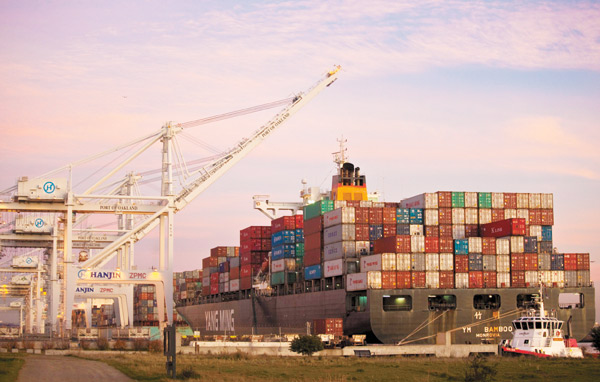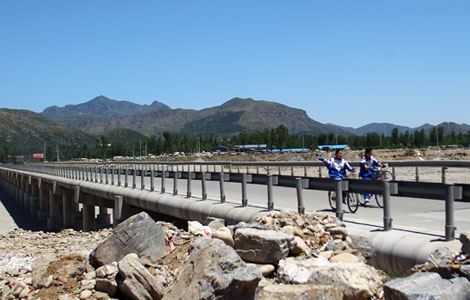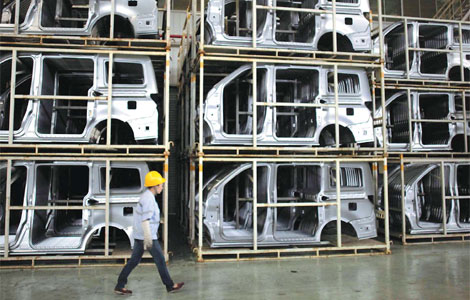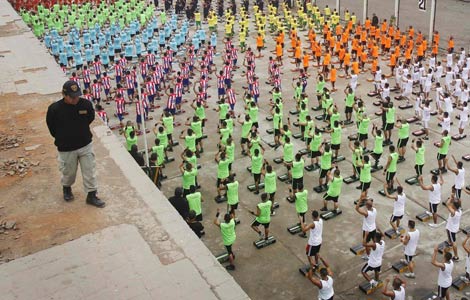Pact 'doesn't seek to exclude' China
Updated: 2013-06-18 07:24
(China Daily)
|
|||||||||||
|
 The YM Bamboo, a container ship operated by China Ocean Shipping Company (COSCO) is docked at the Port of Oakland in Oakland, California, January 14, 2011. [Photo/Agencies] |
The controversial Trans-Pacific Partnership continues to be fanned by speculation about the reasons behind an apparent intentional exclusion of China, led by the United States - but some suggest the argument falls flat for two reasons.
Opponents of the "containment" theory find it difficult to conceive of a comprehensive Asia-Pacific trade pact that excludes China, even if the country is not engaging in the TPP negotiations.
Jeffrey Schott, senior research fellow at the Peterson Institute for International Economics in the US, said China is, for the time being, more inclined to pursue its ties with Asian neighbors before joining the TPP nations.
He told the Shanghai Forum in May that the restraint is basically due to China's political priorities and a lack of willingness to seek a comprehensive trade code.
"I think China is not prepared to enforce the types of obligations being considered under the TPP negotiations and so the issue of blocking its entry to the talks is moot, at least for now," he said.
Schott dismissed the containment notion on three fronts:
First, from a theoretical point of view, it is impossible for a trade agreement to "contain" a large country either by economic or political means.
Second, not a single country in Asia would like to see China's economic decline, as every nation has vital trade and investment relations with Beijing.
China already has a vested interest in maintaining good access to TPP member markets, nine of which have already signed free trade arrangements with China, Schott noted.
He added that its member countries may wish China to become involved in new trade talks as they move towards the long-term Asia-Pacific Economic Cooperation goal of free trade and investment in the region.
"It has committed to the long-term integration strategy endorsed by APEC leaders, and its participation is essential to the long-term viability of such an initiative," he said.
Despite the challenges that may face manufacturing, Schott suggested that Asian countries should use appropriate trade arrangements, in conjunction with domestic economic reforms, to boost their own local productivity levels to compete against Chinese firms at home and abroad.
Schott's third reason for dismissing the containment notion is that the US does not see any reason to confront China, as it works to forge a comprehensive, cooperative and strategic partnership with the world's second-largest economy and a key political stakeholder.
"US officials need to cooperate with China to tackle various regional and global challenges together," he said, while also managing any frictions that may arise as the breadth and scope of their commercial relations expands.
Schott argued that the TPP is designed to set high standards in more legally binding ways than the majority of existing long-term trade arrangements that have been put in place.
He recognized that China's accession to the WTO has made the country go through significant reforms, which consequently have made its border barriers much less restrictive than most developing countries.
But among the many free trade agreements China has signed with other countries, most are of varying quality, both in terms of coverage and depth of reform, he noted.
"Of course we are seeing a change, after the recent trade pact with New Zealand broadened coverage in services and added disciplines to a list of domestic policies.
"But in general, China is not yet ready to undertake TPP requirements, especially with regards to domestic policy reforms," he said.
Peter Cowhey, dean of the School of International Relations and Pacific Studies at University of California, San Diego, added the "containment thesis" has never been on the table, since the Obama administration has been trying to create an initiative to expand in Asia Pacific.
"It was a straight choice of whether China should or should not join, because countries need to ask to join the talks," said Cowhey, who served as senior counselor in the Office of the US Trade Representative in 2009.
"We are seeing no visible progress in resolving the free trade stalemate in the WTO. We definitely see emerging economies enjoying a larger share, as global economic growth continues to stagnate.
"So if you want to expand trade, you start with Asia Pacific," he said.
He also alleged that US domestic politics have had to be taken into consideration, with the Democrats yearning for high-quality trade agreements that consider labor, environment, life services and high-tech issues.
"In short, it is simply a desirable choice for the government's domestic concerns, and has nothing to do with containment of China," Cowhey said.
Schott, too, underlined that China, like any other nation, needs to ask to join the pact.
But he added that the expectation of most TPP participants is that, over the next decade or so, China will join the Trans-Pacific Partnership in some broader Asia-Pacific trade regime that hastens APEC's long-sought goal of a Free Trade Area of the Asia Pacific.
Related Stories
China hopes for transparent US-led TPP talks 2013-06-01 09:30
China to study possibility of joining TPP 2013-05-31 02:11
Factories to face headwinds from enlarged TPP 2013-04-25 02:48
Door to TPP is open for China, says US 2013-03-22 01:25
TPP may drive BRICS into action 2012-09-06 07:54
Today's Top News
China's home price rise continues to slow
China rejects Snowden spying claims
Putin, Obama face off over Syria
China to hold talks with DPRK
3 charged over attack on Chinese
G8 kicks off amid controversy
Travel becomes a family affair
Weibo draws more than just locals
Hot Topics
Lunar probe , China growth forecasts, Emission rules get tougher, China seen through 'colored lens', International board,
Editor's Picks

|

|

|

|

|

|





